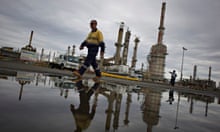Brent crude dipped below the $50 a barrel mark on Wednesday for the first time since the great recession in 2009.
Before a weak rally brought some relief to traders battered by six months of the declining price, the North Sea global benchmark slid more than 2% to $49.66.
It later bounced back to just over $51 after data from the US Energy Information Administration showed stocks had run lower than thought last week.
The late rally helped steady stock markets that have fallen heavily this week, with the FTSE 100 ending the day up 53 points at 6419. In New York, the Dow Jones was up 170 points.
BP and Shell, which have both been battered by the recent fall in prices, recovered a little of their value while other energy stocks also made gains.
The price of Brent crude has slumped from $116 a barrel in June, driven down by a glut in supply and shrinking demand caused by fears about the outlook for world economic growth. Analysts have also pointed to a flight of speculators who have taken cash out of the oil market as another reason for the drop in prices.
James Hughes, the chief market analyst at Alpari, said: “Many will be asking just how much lower the oil price can go before some kind of stabilising effect kicks in.
“However, after every $10 fall experts have been calling the end of the slide, but have seen it continue to drop like a stone.”
Most oil producers have refused to cut production in order to stabilise prices. Saudi Arabia and its fellow members of the Opec cartel voted to maintain their 2015 production schedule at a meeting last month. The oil price came under sustained pressure once Opec ministers announced their decision not to cut supply.
The US, which until recently was a major importer, sanctioned the export of light oil products just before Christmas from surpluses it has generated by fracking. This added to the amount of excess oil in the market.
Hughes said: “Traders will be looking for the $40 level now as a base for the oil price, but after further comments from Saudi Arabia yesterday hinting there will be no move to curb output, no one would be surprised to see the price drop yet lower.”
Several producers, including Russia, Venezuela and Nigeria need oil prices in excess of $100 a barrel to maintain their government finances without sinking into deficit. These so-called break-even levels illustrate the necessary tax revenues from oil production needed to support government spending. Venezuela and Nigeria are believed to be particularly vulnerable after depleting much of their reserves built up ahead of the price crash.
Shippers, airlines and motorists stand to gain from the fall. The Bank of England governor, Mark Carney, said last month that the slide in oil prices was a “net positive development” for the UK.
George Osborne has fired a warning shot at energy companies, fuel retailers and airlines earlier this week, insisting they pass on the benefits of lower oil prices to their customers.
With the cost of living expected to be a big election battleground, the Treasury is planning an investigation into whether lower oil prices are being adequately passed on to consumers by companies and industries linked to oil.
The move will be seen as an attempt to neutralise attacks from Labour, after the party leader, Ed Miliband, took on energy companies last year with his pledge to freeze energy bills for 20 months if he is elected prime minister this May.
The price comparison site theenergyshop.com said British households were being overcharged by as much as £140 a year for energy as the big six gas and electricity suppliers refuse to pass on wholesale price falls.











Comments (…)
Sign in or create your Guardian account to join the discussion